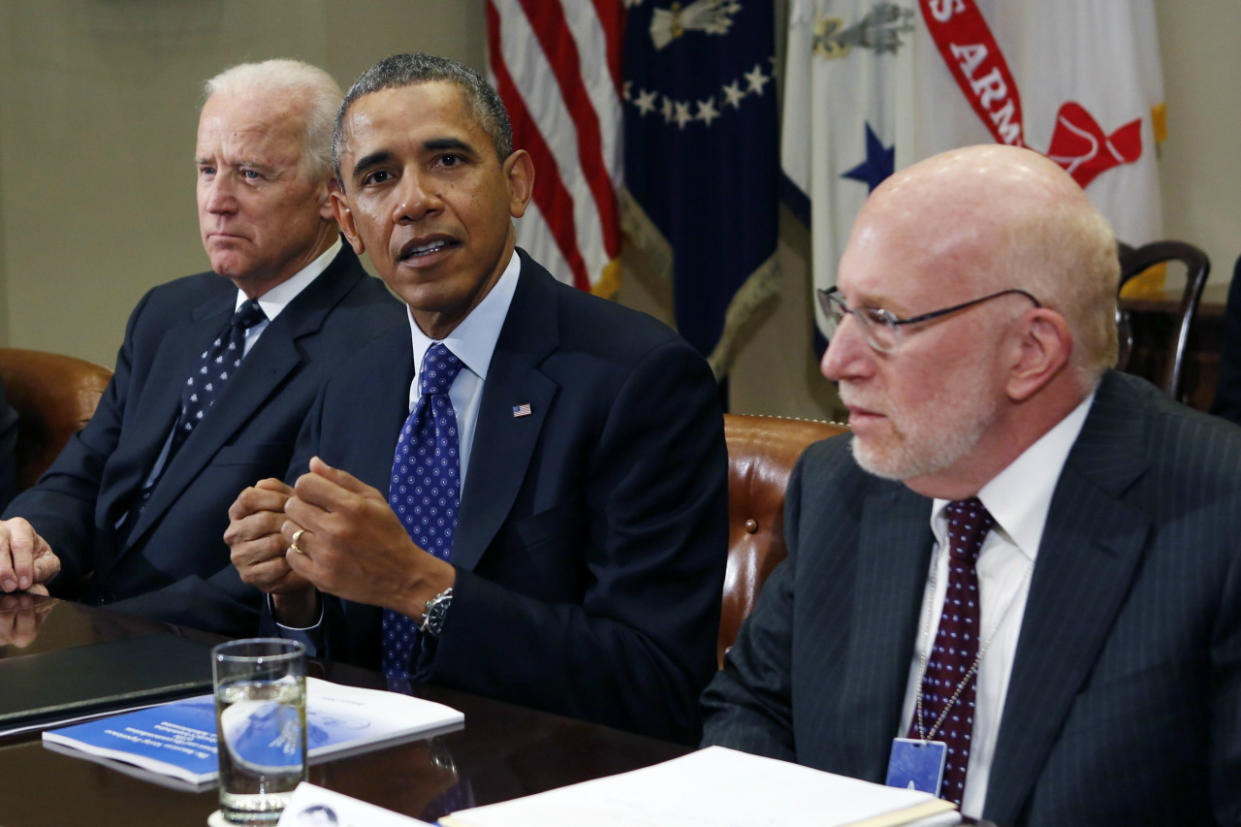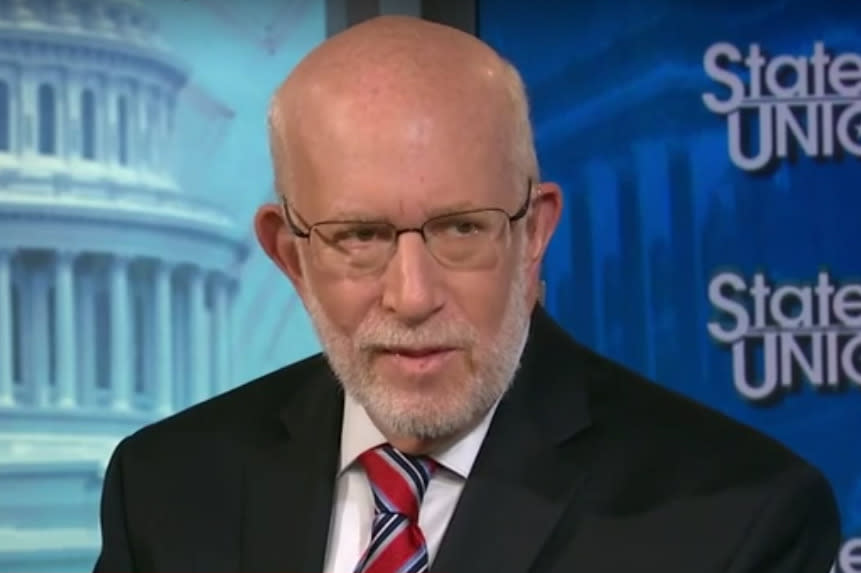Who is Ben Ginsberg, the lawyer facilitating the GOP’s attempt to regain ‘leverage’ in the debates?

President Obama, with Vice President Joe Biden and lawyer Benjamin Ginsberg, at a meeting with members of the Presidential Commission on Election Administration in 2014. (Photo: Kevin Lamarque/Reuters)
Benjamin Ginsberg, a top Republican lawyer and strategist, was invited to facilitate a private meeting Sunday night in Alexandria, Va., where 12 of the 14 GOP presidential campaigns convened to discuss the state of the debates after many of the candidates blasted CNBC’s moderators for bullying them during last week’s debate in Boulder.
Before the meeting, Ginsberg told CNN he was not “in the position of making recommendations” but would discuss how to regain the “leverage” lost by the campaigns when they decided this year to allow the Republican National Committee to negotiate with the networks hosting the debates.
“That loss of leverage is something that I — the campaigns want to talk about, we’ll talk about,” Ginsberg said on CNN’s “State of the Union” Sunday morning.
And Ginsberg knows from experience.
He served as national counsel for both of Mitt Romney’s presidential bids (in 2008 and 2012) and the Bush-Cheney presidential campaigns in 2000 and 2004, playing a key role in the 2000 Florida recount.
Ginsberg, a longtime favorite of the Republican establishment, spearheaded a series of rules changes aimed at limiting the ability of insurgent candidates to woo delegates from the party’s nominee at the 2012 GOP convention — solidifying Romney’s nomination and enraging the tea party.
“This attempted coup by the consultants and the national party elite would completely disenfranchise all rank-and-file Republicans,” Cindy Lake, chairman of the Clark County, Nev., Republican Party, wrote in a press release at the time. “The Clark County Republican Party refuses to stand idly by and allow this Marxist-style power grab to go unnoticed.”
More from a 2012 Tablet magazine profile:
Now in his early 60s, Ginsberg cut his political teeth in a vicious 1985 recount over an Indiana congressional seat that prompted a Republican walkout in the House of Representatives. … He went on to spend eight years as counsel to the central Republican bodies — the National Republican Congressional Committee, the National Republican Senatorial Committee, and finally the National Republican Committee — and was instrumental in orchestrating the party’s redistricting strategy after the 1990 census. In 1993, he joined Patton Boggs, one of Washington’s most powerful lobbying outfits. At the urging of Karl Rove, whom he had met when Rove was consulting for congressional candidates in the 1980s, Ginsberg joined George W. Bush’s campaign in 2000.
The recount, though, was a turning point for Ginsberg, who served as the Bush campaign’s lead counsel during the contested 2000 election and the 36-day legal drama that followed. (Ginsberg was played by actor Bob Balaban opposite Kevin Spacey’s Ron Klain, counsel to the Gore campaign, in the 2008 HBO movie “Recount.”)
In a 2006 speech to Duke University law students, Ginsberg recalled the days leading up to the 2000 election:
The weekend before that election, we were all fairly confident that Governor Bush was going to become President Bush. We were up about five points in most of the key state polls. […] The day before the election I took the folks who worked in the legal office in Austin out to lunch to our favorite Mexican restaurant — because the day before the election there wasn’t really much of anything to do anymore — and we were sitting around talking about lawyers’ fantasies. That’s not an oxymoron, you’ll find that out. And the first fantasy we had that day was walking up the steps of the Supreme Court to actually determine whether your client was going to be the president of the United States. And we got a pretty big laugh out of that. Then somebody said, “God, what if there was a recount? You’ve done recounts, haven’t ya, Ben?” I said, “Yeah, yeah, I’ve done recounts; they happen every year in House races, maybe a state one.” And I said with all the degree of confidence in my 20 years practicing law, “There will never be a presidential recount in our lifetimes.”
He also recalled election night:
Election night is a terrible time because there is literally nothing you can do but watch returns come in. As a lawyer, you answer the random phone call from some state complaining the election is being stolen, and you put people on the scene and it turns out to be drastically overblown. And you go back to fretting and waiting.
At 8:30 that night, the word comes out that Al Gore has won Florida. And that was truly about the most depressing thing you could ever imagine. […] But then people started looking at the returns and they didn’t look quite right. […] And Karl Rove, to his credit, got on the phone and started talking to the networks and jawboning them about what was going on, and sure enough, at about 10:30 they realized he was right and called back Florida and said it was too close to call. And that was like a shot of adrenaline through the campaign.
During the 2004 cycle, Ginsberg stepped down as the Bush campaign’s lead counsel after the New York Times revealed he had given legal advice to Swift Boat Veterans for Truth, the activist group targeting Bush’s Democratic challenger, Sen. John Kerry.
Ginsberg’s experience with recounts didn’t end with Bush. In 2008, he represented Minnesota Sen. Norm Coleman in the Republican incumbent’s failed recount against comedian and Democratic challenger Al Franken. After a six-month court battle, Franken was declared the winner.
Before becoming a lawyer, Ginsberg was a journalist, spending five years as a reporter at various newspapers, including the Boston Globe, before enrolling at Georgetown Law. (He graduated in 1982.) In 2013, Ginsberg was named one of the “100 Most Influential Lawyers in America” by the National Law Journal.
But if you didn’t know Ginsberg before today, you’re not alone. In 2011, he was included on the New Republic’s list of “Washington’s Most Powerful, Least Famous People.”

Ginsberg appeared on CNN’s “State of the Union” Sunday. (CNN/YouTube)


